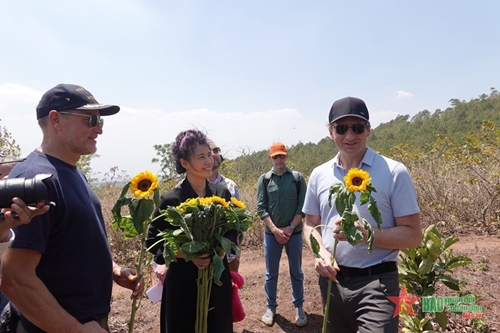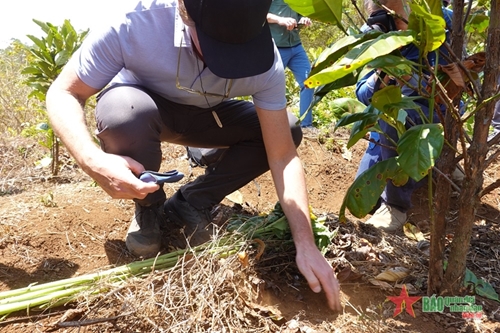On Ham Rong mountain, more than 10km South of Pleiku city, Gia Lai province, where his father passed away, Phillips at noon on March 11 placed sunflowers which he loves because they symbolize peace, sunshine, and prosperity.
Part 1: Vietnam - a beautiful country
The more than one-week visit to Vietnam of congressman Phillips and his friends has helped them further understand Vietnam and its people and look towards to more practical activities in the settlement of war legacy and in fostering the friendship between the two countries.
Fatal plane crash
On the early morning of July 25, 1969, helicopter UH-1H of the U.S.'s 525th military intelligence (MI) group took off from Buon Ma Thuot city and headed for Pleiku. Arriving in Southern Vietnam in November 1965, the group, part of the U.S. Army in Vietnam, was tasked to conduct intelligence activities to support the military of the Republic of Vietnam.
    |
 |
|
Congressman Dean Phillips (in white T-shirt) visits the place where his father lost his life. |
According to a briefing on the results of the crash investigation, all flight conditions were normal at that time except for the low ceiling due to bad weather. The aircraft maintained an altitude of about 140m, flying along Route 14 to the North. Due to the long low altitude flight, the pilot and co-pilot had to take turns steering the plane several times. When flying to the Ham Rong mountain area, visibility deteriorated rapidly, forcing the plane to fly at an altitude of about 15m.
At that time, the pilot taking control the aircraft, reduced the speed from about 200km/h to 150km/h and turning to the right 180 degrees and regain the ceiling under the specified flight conditions. The altimeter on the left side of the plane was not working. The recording from the Pleiku control tower showed that about two seconds after the co-pilot reported the weather, he told the pilot that he felt like he was on a cliff. The plane crashed into the slopes of Ham Rong mountain. The tape also showed that the pilot saw the mountain just before the crash.
On-site investigations revealed that the pilot tried to lift the aircraft up and the propeller at the rear of the plane touched the ground first. The plane skidded about 60m on a steep mountainside of about 50-60 degrees before its main propeller hit the ground and was ejected from the fuselage. The plane folded when the main engine was ejected and rolled about 30m down the mountain, lying on its back and burning there.
Two of the four crew-members and six passengers were killed in the accident. Among the six passengers was Engineer Captain Arthur T. Pfefer (close name is Artie), the father of Congressman Dean Phillips. Captain Arthur T. Pfefer was later interred at Chesed Shel Emes Cemetery in Saint Paul, Ramsey County, Minnesota, the U.S.
Father’s voice urges him to visit Vietnam
Phillips was six months old when the accident happened. He just learned about his father from stories told by relatives, his photos and belongings.
Phillips recalled that when he was small, he often went to his grandmother’s house where the grandmother cooked soup and played the piano for him and they talked about his father. The grandmother showed him photos which he brought along in this visit to Vietnam. Knowing that he could not meet his father again, he found out about him via photos and stories.
Phillips said that his father was a captain in the U.S. Army so he could record real to real audio tapes and send them to his wife in Minnesota. His mother also recorded her words on tapes and her son's humming sounds to send to his father. “I never thought I would see a video or hear my father's voice," Phillips said.
Five years ago, his mother came across the box of all of his letters and all of those tapes. Phillips immediately went on eBay and bought an old tape machine that he could play them. That was the first time he heard his father's voice.
    |
 |
|
Congressman Dean Phillips buries his father's keepsakes in the hope that his father could see his beloved ones. |
Phillips said that the moment he heard his father’s voice and heard him talk about his experience was extraordinary in his life. “Most importantly, he talked, he took photos and he spoke more often of the beautiful Vietnamese friends that he made here,” Phillips said to us. He also talked about the photos his father took of “Vietnamese children with the smiles and the happiness and the joy” that his friends and he also saw on this trip. The U.S. official said that in his father’s tapes and letters was the respect and admiration for Vietnam. That was why he came to Vietnam. He said that he would tell his U.S. friends about Vietnamese culture so they can come and experience themselves to know that “Vietnam is not about war. Vietnam is a beautiful country.”
The most important moment in life
During the trip to Ham Rong mountain, Phillips wore his father's name tag on his neck, holding orders, medals, photos of his and his family members, and his father's watch with the hands stopped at 8:41 a.m., the time the UH-1H crashed on July 25, 1969.
Walking under the canopy of pine trees, crossings many steep slopes covered in basalt soil in the dry season of the Central Highlands, through the beds of coffee trees, Phillips and his friends finally arrived at the place believed to be where his father lost his life.
Phillips said that in Vietnamese culture, Vietnamese people have such a deep appreciation and respect for their ancestors, so does he. He made the trip to learn as much as he could about not just his father, but those with whom he served, those who he fought against and the country in which he died. During the trip, he could feel, experience and hear stories that he never forgets. Phillips confirmed that that was the most meaningful moment in his life.
After praying in Hebrew (Rep. Phillips is Jewish), Phillips carefully put the photos of family members and his iconic coin of position in the House of Representatives in a small bag and explained in tears that he hoped that by burying the bag, his father would be able to see his loved ones. He dug the soil with his own hands, burying the keepsakes next to a coffee tree.
“Mission completed,” he said, adding that he would like to express his condolences to his father, and those who died with him that day, and to all the U.S. and Vietnamese soldiers who died in the war. He hoped to work together to heal the wound of the past and expressed his fortune of being a congressman and personally conduct this trip. He said that most of the people died in the plane crash that day were childless.
By Ngoc Hung
Translated by Mai Huong